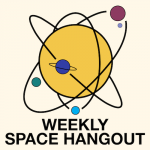Podcaster: Host : Fraser Cain ; Guest: Dr. Aaron Rosengren, Di Wu, Dr. Morgan Rehnberg, Allen Versfeld

Title: Weekly Space Hangout – Solar System Superhighways with Dr. Aaron Rosengren & Di Wu
Link: Cosmoquest: http://cosmoquest.org
Description: Today’s story:
- What happened with the SLS Green Run?
- Calculating the digital color codes of stars.
- NASA gives up on Insight. JAXA = YOLO!
- Alternative propulsions systems are being tested with cubists.
Host: Fraser Cain ( @fcain )
Special Guest: This week we are excited to welcome Dr. Aaron Rosengren and Di Wu (with Dr. Nataša Todorović in the chat), to the Weekly Space Hangout. Their research team recently identified gravitational interactions which have produced a superhighway network of sorts within the Solar System. This network can reduce transport times for objects traveling between Jupiter and Neptune to decades rather than hundreds of thousands, or even millions, of years.
Long-term, this network may potentially be used for human exploration, but in the short-term, it could assist in the study of comets and asteroids.
Dr. Aaron J. Rosengren received his Ph.D. in Aerospace Engineering Sciences from the University of Colorado, Boulder in 2014. He served as a Marie Curie Postdoctoral Fellow for the European Union Asteroid and Space Debris Network, Stardust, from 2014 to 2016, at the Institute of Applied Physics Nello Carrara of the Italian National Research Council. In 2017, Dr. Rosengren worked at the Aristotle University of Thessaloniki in Greece in the Department of Physics, as part of the EU H2020 Project ReDSHIFT. He was an Assistant Professor at the University of Arizona (2017-2020) prior to his appointment at UC San Diego in July 2020. He received the “COSPAR Outstanding Paper Award for Young Scientists” on three separate occasions and has held invited visiting researcher positions in Australia, Israel, Italy, and Serbia.
Di Wu is a 3rd year PhD student of UC, San Diego. His research focuses on space situational awareness, astrodynamics, solar system dynamics, and machine learning. Recognized by the International Astronautical Federation, he was awarded the Future Space Leader for his research that bridges space debris characterization and asteroid dynamics. Di was also invited to attend the space generation congress and was involved in making policy suggestions to the UN about space sustainability.
You can read the team’s paper, The Arches of Chaos in the Solar System, on the AAAS site: https://advances.sciencemag.org/content/6/48/eabd1313
You can learn more about the team’s research on the ScienceAlert website: https://www.sciencealert.com/solar-system-arches-of-chaos-create-cosmic-fast-travel-superhighways/amp
Regular Guests:
- Dr. Morgan Rehnberg ( http://www.morganrehnberg.com/ & @MorganRehnberg )
- Allen Versfeld ( http://www.urban-astronomer.com & @uastronomer )
Today’s sponsor: Big thanks to our Patreon supporters this month: David Bowes, Dustin A Ruoff, Brett Duane, Kim Hay, Nik Whitehead, Timo Sievänen, Michael Freedman, Paul Fischer, Rani Bush, Karl Bewley, Joko Danar, Steven Emert, Frank Tippin, Steven Jansen, Barbara Geier, Don Swartwout, James K. Wood, Katrina Ince, Michael Lewinger, Phyllis Simon Foster, Nicolo DePierro, Tim Smith.
Please consider sponsoring a day or two. Just click on the “Donate” button on the lower left side of this webpage, or contact us at signup@365daysofastronomy.org.
Or please visit our Patreon page: https://www.patreon.com/365DaysOfAstronomy
End of podcast:
365 Days of Astronomy
=====================
The 365 Days of Astronomy Podcast is produced by Planetary Science Institute. Audio post-production by Richard Drumm. Bandwidth donated by libsyn.com and wizzard media. You may reproduce and distribute this audio for non-commercial purposes.
This show is made possible thanks to the generous donations of people like you! Please consider supporting to our show on Patreon.com/365DaysofAstronomy and get access to bonus content.
After 10 years, the 365 Days of Astronomy podcast is poised to enter its second decade of sharing important milestone in space exploration and astronomy discoveries. Join us and share your story. Until tomorrow! Goodbye!

